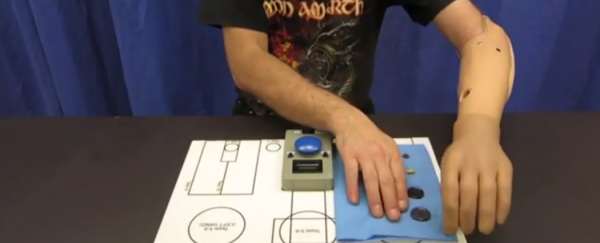Three Austrian men have become the first people in the world to undergo 'bionic reconstruction', having their injured arms amputated to make way for new mind-controlled prosthetics.
The men each lost proper function in their arms and hands years ago in car and climbing accidents. They were diagnosed with a condition called brachial plexus avulsion - a severe and irreversible injury to the network of nerves that transmit signals from the spinal cord to the shoulder, arm, and hand. Having consulted with researchers from the Medical University of Vienna in Austria and the University Medical Centre Goettingen in Germany, they decided to receive a new treatment that involves nerve and muscle transfers, amputation, and prosthesis implantation.
"In effect, brachial plexus avulsion injuries represent an inner amputation, irreversibly separating the hand from neural control. Existing surgical techniques for such injuries are crude and ineffective and result in poor hand function," lead researcher Oskar Aszmann, from the Medical University of Vienna, said in a press release. "The scientific advance here was that we were able to create and extract new neural signals via nerve transfers amplified by muscle transplantation. These signals were then decoded and translated into solid mechatronic hand function."
The men all spent nine months in training before undergoing surgery, learning how to use electrical signals to control a number of specific muscles in a virtual environment before moving on to using a 'hybrid hand', which is a part-prosthetic, part-splint device attached to their own weakened arms. When they were ready, they had their new bionic arm fitted.
Publishing in the Lancet, the researchers describe how the prosthetic works using an array of sensors that detect and respond to electrical impulses that run through nearby muscles. Just three months after the men received it, they reported having much better function in their hands, less pain, and were able to perform everyday activities a whole lot easier. For the first time in years, these men were suddenly able to perform all those essential tasks we take for granted, like picking up a ball, pouring water from a jug, cutting up food with a knife, and operating shirt buttons.
"So far, bionic reconstruction has only been done in our centre in Vienna," says Aszmann. "However, there are no technical or surgical limitations that would prevent this procedure from being done in centres with similar expertise and resources."
You can watch one of them in action here:

It looks a little awkward, until you remember that all of that movement is being controlled by nothing but his MIND. And that is nothing short of incredible. And you know what else is incredible? This isn't the only team working on this kind of technology. Researchers in Sweden are doing it, and researchers in Korea are creating a new type of sensitive skin to make the whole thing even better.
